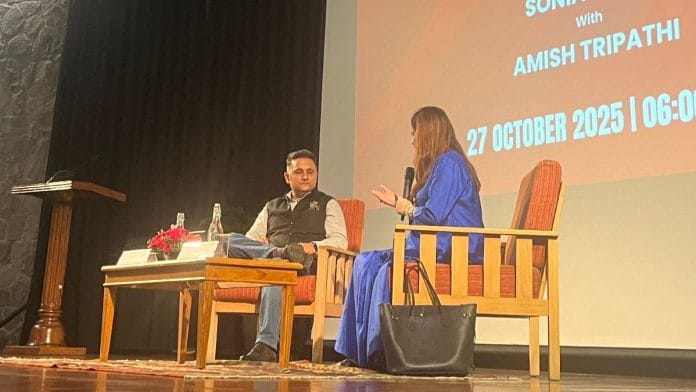New Delhi: Amish Tripathi is a self-confessed workaholic. When he’s not writing, he’s researching, he said.
At a recent fireside chat with senior journalist Sonia Singh, held to commemorate the launch of his latest book, The Chola Tigers: Avengers of Somnath, Tripathi ventured into the cultural context that has been key to his books’ success, his (and the country’s) fixation with dharma, and the changing mediums and forms of consumption –– a must for intergenerational dialogue.
The author, who has written 12 books in the last 15 years, is prolific –– to say the least. His books, loosely characterised as historical fiction, have turned Indian gods and goddesses into superhero-like figures, fitted with fan-followings.
“The unconscious bias you have of the culture you have emerged from is not easy to wipe out,” Tripathi said. “But dharmic thinking is the concept of mutual respect.”
He delved into examples, evidence of India’s cultural fluency and forward thinking. For example, he said, English does not have the concept of a third gender entrenched into the language. But Sanskrit does. It’s important because “culture informs the way you look at things.”
Through the conversation, Tripathi repeatedly pointed to how enmeshed concepts and theories of the divine really are in Indian society.
“The way we approach the divine is different from other cultures. Those who we worship –– the difference [between us and them] is that we are yet to discover [the divine within us] and they already have,” he said. “They are not figures we need to be afraid of. If you look at it that way, it’s not so difficult to see them as superheroes.”
Other than his preoccupation with gods and goddesses and the uncanny ability to build bestsellers –– airport bookshelves are typically lined with his books –– Tripathi is also big on the India growth story.
“European economies are debt-ridden. Things are going to get worse,” he said. “I’m a complete India bull. All my money is invested in India.”
Also read: Delhi’s RSS@100 discussion turns into a debate on caste system
Gen Z and dharma
If the discussion’s audience was anything to go by, Tripathi has a cult-like following. The auditorium at the India International Centre on 27 October, while not full, was remarkably different. There were a number of young people; people who said they had withstood hours of traffic just to get a chance to hear Tripathi speak.
However, an audience member still declared: if Tripathi needs to remain relevant, he needs to cater to Gen Z, who in her experience, simply does not read.
The author is complying with these changing mandates. He is helming a documentary film, and is creating a video game called the Age of Bharaat. And according to him, Gen Z cannot be neglected –– they need their ‘elders’ more than ever.
“Many of these algorithms are evil. I use this word mindfully,” he said. “We’re going to try and teach them dharma. Not in a satsang way, but in a relaxed way.”
A 15-year-old audience member asked Tripathi an interesting question –– can Hinduism be satirised? Can’t it use a bit of satire?
Maybe so. But Tripathi’s not going to be the one doing it.
“It’s not my style. I genuinely worship the gods I write about,” he said.
(Edited by Aamaan Alam Khan)






